How Much Does A Full Service Local Move Cost?
A full service local move costs between $400 and $3,000 on average. Most people pay around $1,500 for a local move with professional movers. The exact cost depends on how big your home is, how many movers you need, and what services you want.
This guide will help you understand what drives these costs and how to get the best value for your money. We'll break down everything from hourly rates to extra fees, so you can plan your budget and avoid surprises.
What Is A Full Service Local Move?
Full service local moves include everything you need to get from your old home to your new one. The moving company handles all the heavy lifting, so you don't have to worry about the hard work.
What's Included In Full Service Moving
A full service move covers these main parts:
- Packing your belongings - Movers wrap and box all your items using professional supplies
- Loading the truck - The crew carefully loads everything into their moving truck
- Transportation - They drive your stuff to your new home
- Unloading - Movers take everything out of the truck and bring it inside
- Basic furniture placement - They put items in the rooms where you want them
Local Move Distance Rules
Local moves are trips within the same city or area. Most moving companies consider it local if you're moving:
- Less than 50 miles away
- Within the same state
- In the same metropolitan area
If you're moving farther than 100 miles, it becomes a long-distance move with different pricing.
How Much Does Full Service Local Moving Cost?
The cost to hire full service movers depends on several key factors. According to theU.S. Bureau of Labor Statistics, employment in transportation and material moving occupations is projected to grow faster than average, which impacts pricing in the moving industry. Here's what you can expect to pay based on your home size.
Hourly Rates For Local Movers
Most local moving companies charge by the hour. Full-service movers cost about $25–$100 per hour per moving crew member for local moves. The total hourly rate depends on how many people are on your moving team.
Here's what you can expect for different crew sizes:
- 2 movers: $100-$200 per hour
- 3 movers: $150-$300 per hour
- 4 movers: $200-$400 per hour
- 5+ movers: $250-$500 per hour
What Makes Costs Go Up Or Down
Several things affect how much you'll pay for your move. According toMove.org's comprehensive moving cost analysis, the average cost of full-service moves is $9,060, but local moves are significantly less expensive.
Home size - Bigger homes need more movers and take longer to pack and move
Amount of stuff - More belongings mean more time and possibly a bigger truck
Distance within your city - Even local moves cost more if you're going across town
According to theAmerican Moving and Storage Association, approximately 40 million Americans move each year, with peak moving season occurring between May and September. This drives up demand and prices during these months.
Day of the week - Weekend moves are more expensive than weekday moves
Extra services - Things like packing supplies, storage, or moving special items
What Services Are Included In Full Service Moving?
Full service moving companies take care of everything, but it's important to know exactly what you're getting for your money.
Standard Services
Every full service move includes these basic services:
Professional packing - Movers bring supplies and pack everything safely. They know how to wrap fragile items and fill boxes properly.
Furniture disassembly - The team takes apart beds, tables, and other furniture that won't fit through doors.
Loading and unloading - Movers handle all the heavy lifting. They use proper techniques to avoid injury and damage.
Transportation - Your belongings travel in a professional moving truck with padding and straps.
Furniture reassembly - Movers put your furniture back together in your new home.
Common Add-On Services
You might want to pay extra for these services:
Packing supplies - If you don't have boxes, tape, and bubble wrap, movers can provide them for $200-$500.
Storage solutions - Many companies offer short-term storage if you need it. Most full-service movers offer the option to store your items, and many provide free storage for up to 30 days.
Specialty item moving - Things like pianos, artwork, or hot tubs need special care and cost extra.
Unpacking services - Some companies will unpack your boxes and put things away for an additional fee.
Additional Costs And Fees To Expect
Beyond the basic hourly rate, you might face extra charges. Knowing about these ahead of time helps you budget better.
Common Extra Fees
Long carry fees - If movers can't park close to your door, you might pay $75-$150 extra.
Stair fees - Moving items up or down stairs can add $50-$100 per flight.
Elevator fees - Using elevators in apartment buildings sometimes costs $25-$75 extra.
Heavy item fees - Items over 200 pounds might have special charges.
Fuel costs - Some companies charge for gas, especially for longer local moves.
Seasonal And Timing Costs
When you move affects what you pay:
Summer premium - Moving between May and September costs 20-30% more because it's busy season.
Weekend rates - Saturday and Sunday moves are usually $50-$100 more expensive.
Holiday surcharges - Moving near holidays can add 10-20% to your total cost.
Rush fees - Booking last-minute might cost extra if movers have to rearrange their schedule.
Packing And Supply Costs
On average, it costs $900 to $1,500 to have a moving company pack you. Packing costs are calculated based on the size of the move. Here's a breakdown:
- Studio/1 bedroom: $250-$500
- 2 bedrooms: $500-$800
- 3 bedrooms: $800-$1,200
- 4+ bedrooms: $1,200-$1,800
If you buy supplies yourself, expect to spend $150-$300 on boxes, tape, and packing materials.
How To Save Money On Full Service Moving
Moving can be expensive, but there are smart ways to cut costs without sacrificing quality. Research fromRamsey Solutions shows that strategic timing and preparation can significantly reduce moving expenses.
Timing Your Move
Move during off-season - Fall and winter moves (October through April) cost less because fewer people are moving.
Choose weekdays - Tuesday through Thursday moves are usually cheaper than weekends.
Avoid month-end - Many leases end on the 31st, so moving mid-month saves money.
Reduce What You Move
Declutter first - The less stuff you have, the less you pay. Sell, donate, or throw away things you don't need.
Use up perishables - Don't pay to move food that will spoil. Eat what you have before moving day.
Consider furniture replacement - Sometimes it's cheaper to buy new furniture than move heavy, old pieces.
Do Some Work Yourself
Pack non-fragile items - You can pack books, clothes, and linens yourself to save on packing costs.
Disassemble furniture - If you're handy, take apart beds and tables before movers arrive.
Clean before they come - Having a clean home helps movers work faster.
Get Multiple Quotes
Always get quotes from at least three moving companies. It's not unusual for moving estimates to vary by thousands of dollars, especially if you're moving long-distance.
When comparing quotes, look at:
- What services are included
- The hourly rate and minimum hours
- Any extra fees
- The company's reputation and reviews
Understanding Moving Quotes And Estimates
Getting the right quote helps you avoid surprises on moving day. Here's what you need to know about different types of estimates.
Types Of Moving Estimates
Binding estimate - This is a fixed price that won't change, even if the move takes longer than expected.
Non-binding estimate - This is just an estimate. The final cost might be higher or lower based on actual time and services.
Not-to-exceed estimate - You won't pay more than this amount, but you might pay less if the move goes faster.
What To Ask Moving Companies
When getting quotes, ask these important questions:
- What's included in the hourly rate?
- How many movers will be on the crew?
- What's the minimum number of hours I'll be charged?
- Are there any extra fees I should know about?
- Do you provide packing supplies?
- What insurance coverage do you offer?
Red Flags To Avoid
Watch out for these warning signs:
- Quotes that seem too good to be true
- Companies that want large deposits upfront
- Movers who give estimates without seeing your home
- No written contract or estimate
- Companies without proper licensing or insurance
Regional Cost Differences
Where you live affects how much you'll pay for moving services. Understanding regional differences helps you budget more accurately.
High-Cost Areas
Moving costs more in expensive cities like:
- New York City: $110-$200 per hour
- San Francisco: $120-$220 per hour
- Los Angeles: $100-$180 per hour
- Washington DC: $100-$190 per hour
Average-Cost Areas
Most mid-size cities fall in this range:
- Phoenix: $80-$150 per hour
- Dallas: $75-$140 per hour
- Denver: $85-$155 per hour
- Atlanta: $75-$145 per hour
Lower-Cost Areas
Smaller cities and rural areas typically charge less:
- Small towns: $60-$120 per hour
- Rural areas: $50-$100 per hour
Remember that even in lower-cost areas, you still want to hireprofessional local movers who are licensed and insured.
Insurance And Protection Options
Protecting your belongings during a move is important. Here are your options and what they cost.
Basic Coverage
All moving companies must provide basic liability coverage. Released value protection is the minimum amount of insurance mandated by federal law and is included for free on every move. According to the Federal Motor Carrier Safety Administration, this coverage only covers your items at a rate of $0.60 per pound per item.
This means if your 50-pound TV gets damaged, you'd only get $30 - not very helpful for expensive electronics.
Full Value Protection
This upgraded coverage protects items based on their actual value, not weight. Full value protection is an add-on insurance option that provides reimbursement based on the value of each item rather than weight.
Full value protection typically costs 1-2% of your belongings' total value. So if your stuff is worth $50,000, you'd pay $500-$1,000 for this coverage.
Third-Party Insurance
You can also buy moving insurance from companies that aren't your mover. This sometimes offers better coverage or lower costs than what moving companies provide.
Check with your homeowner's or renter's insurance too - they might cover moving damage.
Tips For A Successful Full Service Move
Getting ready for moving day helps everything go smoothly and can save you money.
Before The Movers Arrive
Confirm details - Call the moving company a few days before to confirm the time, crew size, and services.
Prepare your home - Clear pathways, disconnect appliances, and pack a "first day" box with essentials.
Take photos - Document valuable items before packing in case you need to file an insurance claim.
Set aside valuables - Keep jewelry, important documents, and cash with you during the move.
On Moving Day
Be present - Stay available to answer questions and approve the placement of furniture.
Do a walkthrough - Check the moving truck before movers leave to make sure nothing was forgotten.
Keep inventory - Most movers provide a list of items. Keep your copy safe.
Check for damage - Look over your belongings as they're unloaded and note any problems immediately.
After The Move
Tip your movers - Generally speaking, you should tip $20 per person for a half-day move and $40 per person for a full-day, eight-hour move.
Leave reviews - Help other people by sharing your experience online.
File claims quickly - If something was damaged, report it to the moving company right away.
When To Consider Alternatives
Full service moving isn't always the best choice. Sometimes other options make more sense.
Hybrid Moving
This combines DIY and professional services. You might:
- Pack yourself but hire movers for loading and transport
- Rent a truck but hire labor to help load it
- Use amoving container and pack it yourself
DIY Moving
If you're on a tight budget and don't have much stuff, doing it yourself might work. You'd need to:
- Rent a truck
- Buy packing supplies
- Round up friends to help
- Do all the heavy lifting
Moving locally will cost between $150 and $250, covering the price of renting a moving truck and buying packing supplies for a DIY move.
When Full Service Makes Sense
Choose full service moving if you:
- Have valuable or fragile items
- Don't have time to pack and move
- Have physical limitations
- Want insurance protection
- Are moving during busy season when truck rentals are expensive
Frequently Asked Questions
How Much Should I Tip My Movers?
The amount you should tip movers can vary, but generally speaking, you should tip $20 per person for a half-day move and $40 per person for a full-day, eight-hour move. You can also tip 10-20% of the total moving cost.
Do I Need To Pack Everything Before Movers Come?
No, that's what full service moving is for! The movers will pack everything for you. However, you should pack personal items like jewelry, important documents, and medications to keep with you.
How Far In Advance Should I Book Movers?
You should book your move at least six weeks in advance. Start researching options for your upcoming move around eight weeks in advance. During busy summer months, book even earlier.
What If My Stuff Gets Damaged During The Move?
Report damage immediately to the moving company. Take photos and keep all paperwork. Most companies have a claims process, and your insurance coverage will determine what you're paid.
Can I Move During Winter To Save Money?
Yes! Winter moves (October through April) typically cost 20-30% less than summer moves. Just be prepared for potential weather delays.
Final Thoughts
A full service local move typically costs between $400 and $3,000, with most people paying around $1,500. The exact amount depends on your home size, how much stuff you have, and what services you need.
The key to getting good value is understanding what's included, comparing multiple quotes, and planning ahead. While full service moving costs more than doing it yourself, it saves time and reduces stress - especially valuable when you're starting fresh in a new home.
Remember to get quotes from several companies, ask about all fees upfront, and chooseprofessional movers who are licensed and insured. With proper planning, your move can be smooth and worth every penny.
Ready to get started? Contact our team for a free moving estimate and let us handle the heavy lifting while you focus on settling into your new space.



